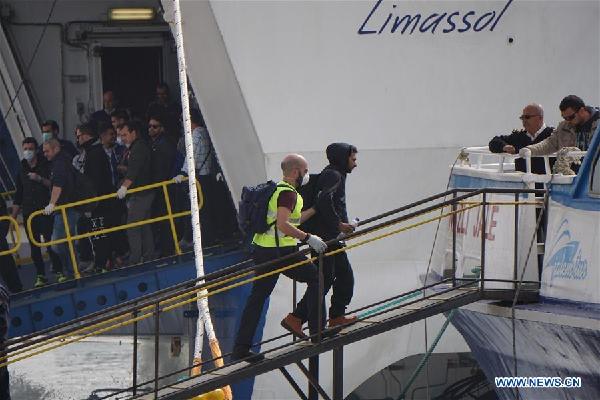Refugees worry about Turkey deportations

 0 Comment(s)
0 Comment(s) Print
Print E-mail CNTV, April 9, 2016
E-mail CNTV, April 9, 2016
To the refugee camps on the Greek island of Lesbos, migrants and refugees stranded there continue to feel worried of being deported back to Turkey. That comes under a controversial Turkey-European Union deal.
Over 3,000 asylum applications have already been filed in Lesbos.
"We came to Greece on March 20th. So we were in Moria, and they gave us two choices. One of them to apply asylum in Greece, the second is to go back to Turkey, so we choose to apply asylum in Greece," said Osama Alkhatib, a refugee from Syria.
|
|
|
A Refugee, escorted by the European border control agency Frontex personnel, boards a vessel at Mytilene port in Greece, on April 8, 2016. A total of 124 refugees and migrants were returned to Turkey from Greek islands on Friday, the second of such mission in a week under the EU-Turkey deal to cope with the refugee crisis. (Xinhua Photo/Anthi Pazianou) |
For Syrian refugees like him, going to Turkey is not a choice.
"So it is better to go to Syria, not to Turkey. We have nothing in Turkey to do. No jobs, no study, no life, everything is expensive in Turkey," said Osama Alkhatib.
Inside the Moria Detention Center, many continue their protest against Europe's closed borders. Most of them are believed to be from Pakistan.
One man living in an unofficial camp close to Mytilene port, said his friends are uncertain of their future.
"I cannot back to Turkey, I cannot go back to Pakistan because I am not safe in Pakistan, I am not safe in Turkey. Many people, my friends he says, if we go back Turkey he will (commit) suicide. We cannot (go) back," said Tasif Ali, a refugee from Pakistan.
And in the Idomeni refugee camp on the Greek-Macedonian border, scuffles broke out between migrants and police on Thursday.
About 40 protesters shoved the police and demanded the border be opened. Their fate is still unknown.






